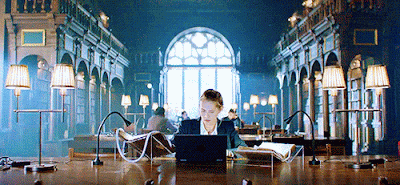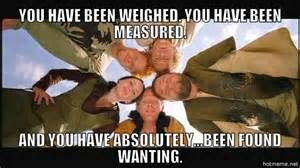When I first read The Discovery of Witches trilogy, then saw the first season of the show, I instantly recognized Diana Bishop. She was exactly what I thought a medievalist was and what I wanted to be. The first book came out in 2011, a year after I finished my MA in English literature, the year my mom died, and the year I started thinking about applying to PhD programs. I didn't just want to be THAT kind of medievalist, both in personality and research interest, but the learning and researching experience was what I had never had and always wanted. I wanted old libraries, rooms at the college, to inexplicably bike everywhere. I wanted a life where I taught, and read, and researched and apparently never had to worry about juggling a day job or paying for rent. I wanted colleagues I sat, drank tea with, and talked about big ideas. I wanted collegiality and an intellectual space. I wanted to spend my time poring over old manuscripts about fairies, and demons, and magic, and alchemy.
I wanted a version of education and academia I had never experienced.
The last few years as I worked on then finished my dissertation, my scholarly work has a clear narrative and trajectory. While informed by my medieval and early modern work all of my publications are firmly set in popular culture, examining and analyzing how fairy tales and horror films revise and reimagine folkloric figures. And I have to tell you that the reason this is what my work has been is because I've gotten the feeling for the last ten years that I'm not worthy of working in the medieval and early modern fields. My work is not scholarly enough. My writing is not good enough. My credentials aren't good enough. I thought/think of this quote from A Knight's Tale a LOT.
I can tell you the first time I felt this. It was ten years ago. I had presented a paper at SAMLA on the 1688 illustrations of Paradise Lost that focused on the monstrosity of the devil. I was really proud of it, and it was well received. So I expanded it to an article and submitted it. Literally YEARS later (they lost it despite several check ins about the status) I received an answer from the editor and the reviewer comments which said, and this is not hyperbole, that I clearly knew nothing, should have been ashamed of submitting the work when I clearly knew nothing, and that my article was total garbage. To say I was crushed would be an understatement. And that was the moment I turned more towards the fairy tale, folklore, and popular culture conferences, academics, and publications.
Later as I worked on graduate classes, all the ways I fell short was a reoccurring theme. One medievalist professor, whose class I loved, so much so I audited their Chaucer class, told me that my writing was so lacking and deficient that they suggested I buy the book Revising Prose, because my work was so substandard. The program I went through had professors from name schools, excellent programs, and again and again I was told that while some of my ideas were interesting, my work just did not make the grade. I passed these classes, I earned As and the occasional B on papers, but again and again I was told that I didn't quite fit. Another medievalist who I also admired greatly, and I took multiple classes with totally dismissed me when I tried to talk to them about getting a PhD.
I felt again and again that I was missing key skills, didn't know the names of theorist, and frankly when I DID learn their names thought quite a lot of them were full of shit. But I inexplicably kept going. I applied to PhD programs, I got rejected, I got waitlisted, I got accepted. I did well. But I also went through my program fast. I was older entering my program, and I felt the weight of the loans I had to take out to get through school even with "full" funding. So I finished course work in 3 semesters. I wrote my dissertation in a year. I wrote a different dissertation in another year.
And still continued to feel like I didn't fit. Because I went in knowing that I wanted to study folkloric figures through the medieval and early modern period, and then in popular culture, I was in the British and Irish Literary Studies program, not the Medieval program. While I took classes with the medieval professors, and used Old English as my language requirement, and knew all the medieval students, I was not one of them. We did not commiserate over Latin, paleography, or medieval history classes. I also found myself leap frogging over the cohort I came in with, graduating before my mentors even. It wasn't anything that bothered me per se, but it certainly reinforced to me the feeling I had carried with me that my research interests and me myself were not a fit. I published a lot in graduate school but I never heard from any of my professors that it was good, or they read it, or really anything.
I never once, out of three institutions and three VERY different experiences did I feel like there was a place for me, as a person or as a scholar. I never felt like my academic or scholarly experience was what it was supposed to be. I never felt like my work was what people expected.
I have been lucky that the counter to this has been all the lovely scholars I have met through social media who have been so nice and supportive of my work, and have shown me their own work which often counters the narrow definition I was told was medieval studies.
I was also lucky that my tenure track job is a generalist position, where I teach the early British survey, Shakespeare, and composition. I get to teach the range of my interests. But all of these feelings of not fitting came back this year as I looked at our tenure requirements which initially said that you needed a book or three articles (it has since been changed to say three peer reviewed pieces). I had two chapters in edited collections, one out this year, one that should be out later this year, but both on popular culture. I started to stress about submitting articles, ones I felt needed to be in the medieval and early modern fields to balance and show the range of the job I was hired for. And suddenly I felt frozen thinking I was going to do all this work on these articles and again be told I was not good enough, and then run out of time to submit something else, and ruin my tenure changes, and round and round.
And at the end of my first year as a professor and one thing I continue to struggle with is how I describe myself. Am I an English professor? A medievalist? An early modernist? A fringe folklorist? Am I still Dr. Devil? Who am I and what work do I do?
I worked really hard on an article on Guthlac, which took a lot because it read the tale through an Indigenous lens AND had a lot of translation as the foundation, so it was like being dumped over a waterfall and then as soon as you caught your breath went over another one. I was nervous about both the material and the translation work. But I was ultimately really proud of the work, and while I am still waiting to hear on rejection/acceptance, I think it's good work and hope the newer journal I submitted to takes it.
I have a couple of other ideas too that I have sketched out but need to write up. One looks at medieval and early modern Merlin texts as conversion narratives. Another looks at the Katherine hagiography by applying tattoo sociology, the idea of narratives written on the body. Both clearly medieval and early modern texts, but with non-traditional twists. And in general, that's what my work does, looks at older texts through newer lenses. But I don't know if it's stuff that would be accepted at more traditional journals, and with the time between submission, review, rejection/acceptance, there is a time factor.
I want to do more medieval work. I REALLY want to do some work with manuscripts, John Dee, more traditional medieval and early modern topics. But I worry that even though I am a "real" professor with a "real" job, I am not a "real" medievalist.
With full tattoos, and lack of professional attire, I certainly don't look like a "real" medievalist.
Certainly my years of high school teaching and first generation status means I don't have the pedigree of a "real" medievalist.
With the job I have the likelihood that I will travel abroad, or work in these libraries, or ever touch or even be in the same room as these manuscripts, is slim to none. So rewatching Diana Bishop library scenes is probably as close as I'm going to get. Which is weird and funny, because one of the articles I'm most proud of came out of archive work on a New Mexican folk hero.
Maybe though I need to look at my inspirations- Hildegard of Bingen, Héloïse, the incomparable Deborah Harkness herself, for the type of medievalist I want to be.
Manuscripts are available online in digital editions.
I am a doctor with a job, and no one telling me what I can and cannot write on.
So maybe I write what I write and I submit it and just keep submitting until I find a fit.
Maybe I need to let go of those ten year old voices in my head telling me I don't belong here.




No comments:
Post a Comment